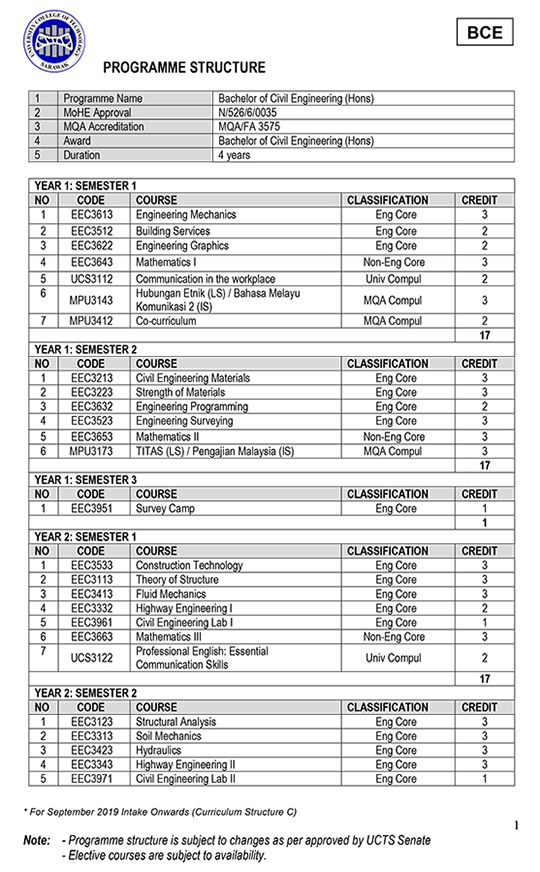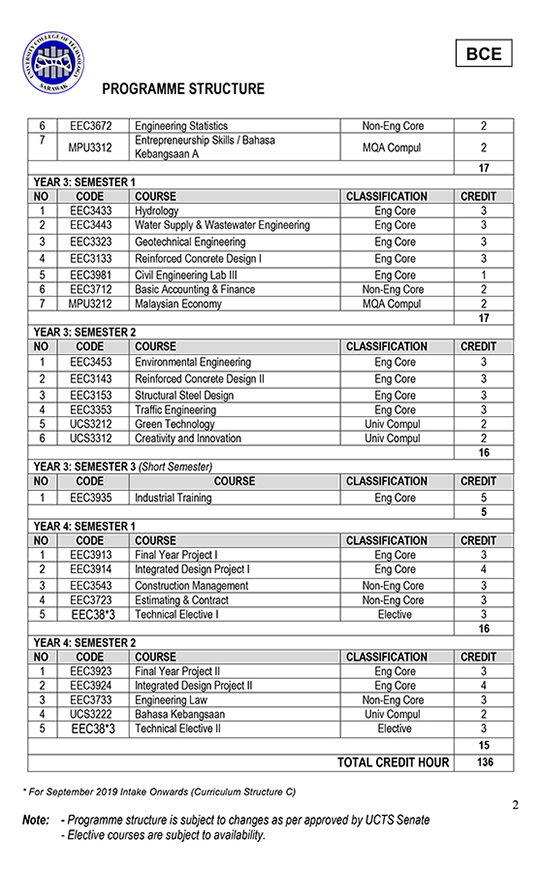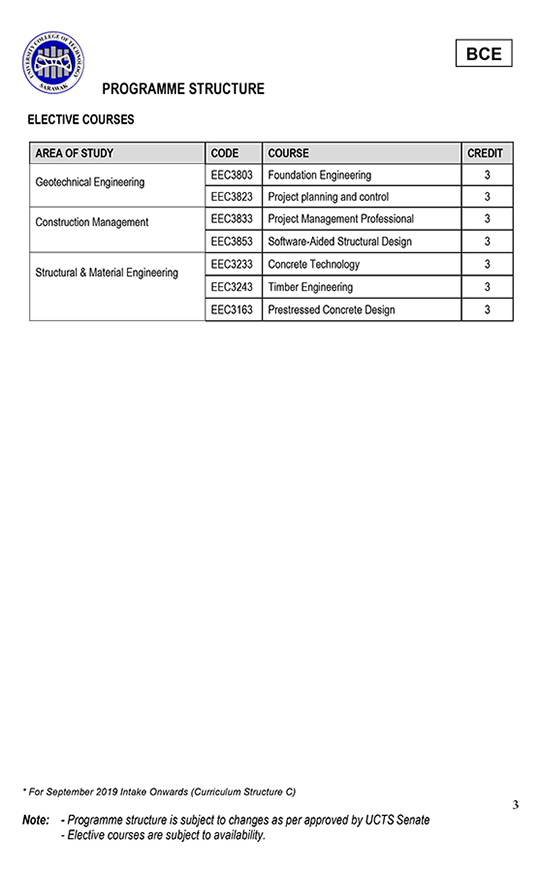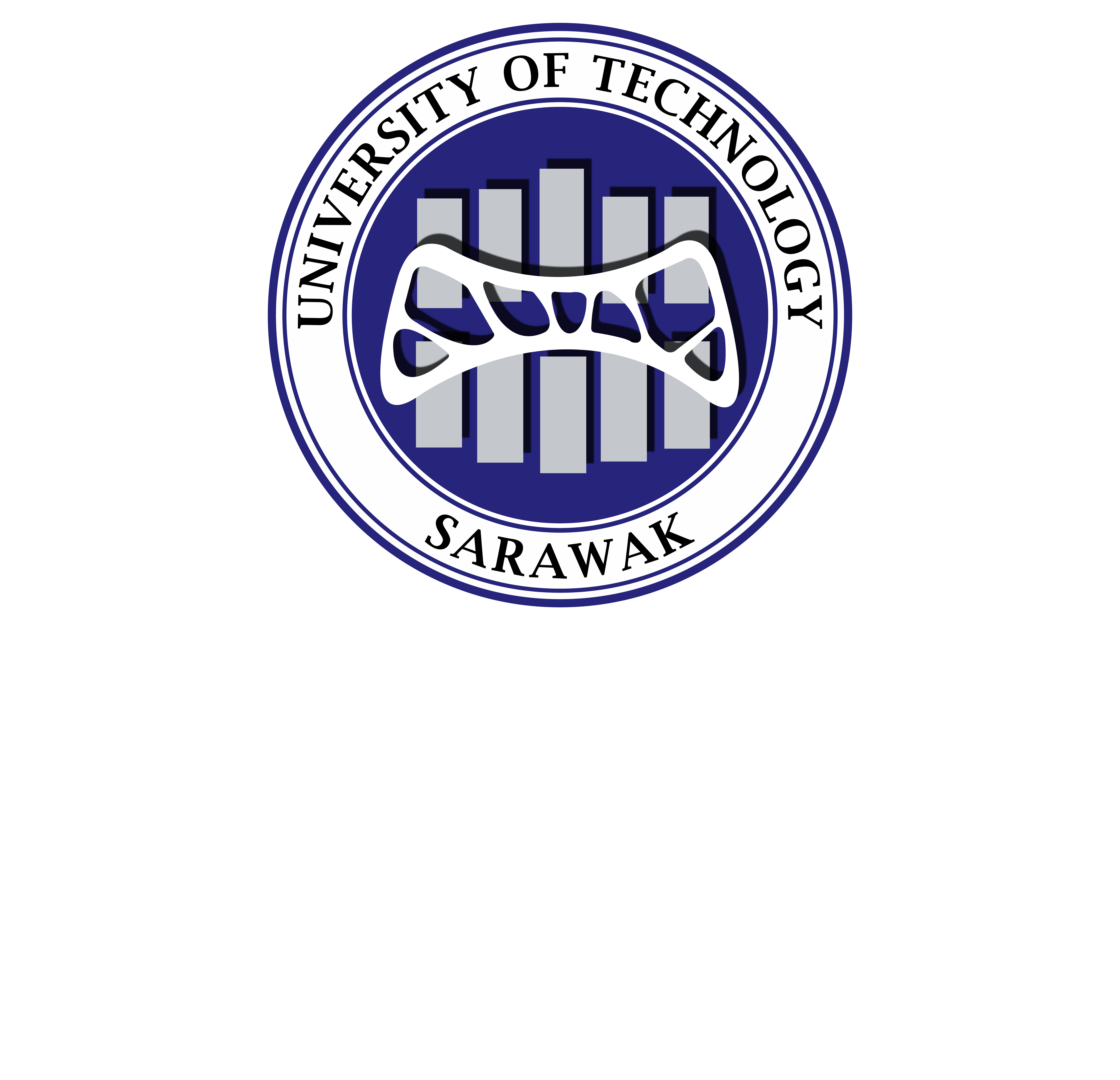Programme Overview
The Bachelor of Civil Engineering (Hons) is one of the pioneer programmes being offered by School of Engineering and Technology (SEngTech) in 2013, along with the formation of University College of Technology Sarawak (UCTS).
The Bachelor of Civil Engineering (Hons) encompasses a wide range of disciplines, covering the fields of engineering such as structures, materials, hydraulics, geotechnical, highway and surveying. It nurtures among the graduates engineering knowledge, analytical and problem solving skills, as well as the other technical and soft skills.
The curriculum is in sync with current development of the construction industry and engineering practices, particularly in the aspects of structural design and consultancies, construction technologies, usage of modern tools and technical software and project management approaches. The laboratory works, covering the mentioned fields of engineering, further equip students with practical and investigative skills.
Programme Aims
To produce graduates with strong civil engineering background, capable to fulfill their professional demands in highly competitive global markets with confidence, outstanding ethical and moral values.
Programme Educational Objectives (PEOs)
- To produce engineers with sufficient knowledge and skills in sync with appropriate attitude to succeed in positions in civil engineering practice and in other fields they choose to pursue.
- To produce engineers with abilities for effective communication, collaborative working in diverse teams, and continual development through professional involvement.
- To produce engineers who pursue lifelong learning, stay informed of current civil engineering practices and contemporary issues, and actively involving in research.
Programme Learning Outcomes (PLOs)
At the end of the programme, graduates should be able to:
- Apply knowledge of mathematics, sciences, civil engineering fundamentals and engineering specialisations to solve complex engineering problems.
- Identify, formulate, research literature and analyse complex engineering problems creatively and innovatively using the first principles in civil engineering fields to acquire substantiated conclusions.
- Develop and design solutions for complex engineering problems, systems and processes using integrated & interdisciplinary approaches with appropriate considerations for public health and safety, cultural, societal and environmental sustainability.
- Use the advance techniques, competent skills, appropriate methods and tools to implement complex engineering development, with an understanding of the limitations.
- Apply contextual knowledge to assess societal, health, safety, legal and cultural issues, and the consequent responsibilities relevant to professional engineering practices and solutions to complex engineering problems.
- Conduct and commit to professional and ethical responsibilities.
- Communicate effectively on complex engineering activities with the engineering community and the society, verbally and in written forms.
- Function effectively both as individuals and in a group as a leader or a team member in diverse teams and in multi-disciplinary settings.
- Demonstrate understanding and apply knowledge of engineering management principles and economic decision-making to manage works and projects in multidisciplinary environments.
- Design and conduct investigations for complex problems using research-based knowledge and methods, such as design of experiments, analysis and interpretation of data, and synthesis of information to provide valid conclusions.
- Engage in life-long learning.
- Evaluate the sustainability and impact of civil engineering solutions for complex engineering problems in societal and environmental context.
Careers In Civil Engineering
Civil Engineers deal with construction management which include planning, design, construction and maintenance of built environment. They are in constant demand, mainly from the consultant firms, constructors, developers, local council, public work department, drainage and irrigation department, utilities companies, authorities, engineering product manufacturers, research institutions and others. In the context of Sarawak, catalyzed by Sarawak Corridor of Renewable Energy (SCORE) the demand for Civil Engineers increases further.
Accreditation
Bachelor of Civil Engineering (Hons) fulfills the requirements by Malaysian Quality Agency (MQA) and Engineering Accreditation Council (EAC), allowing graduates (with work experience) to register as professional engineers under the Board of Engineers Malaysia (BEM).
Entry Requirements
- Pass STPM/A-level with full pass in Mathematics and Physical Science; or
- Pass UEC with five (5) Grade B’s including Mathematics and Physical Science; or
- Pass Matriculation / Pre-U/ Foundation in Science from recognised institutions with minimum CGPA 2.0; or
- Pass Diploma in related field from recognised institutions with minimum CGPA 2.0; or
- Other equivalent qualifications recognised by the Malaysian Government
Tuition Fees
Study loans are available from PTPTN. The tuition fees above are only applicable to local / Malaysian students. For more details and information, please contact our Marketing Office at (+6) 084-367300 or email to enquiry@uts.edu.my.
Programme Structure and Synopsis
Click Here to download synopsis
For Intake February 2019 onwards






